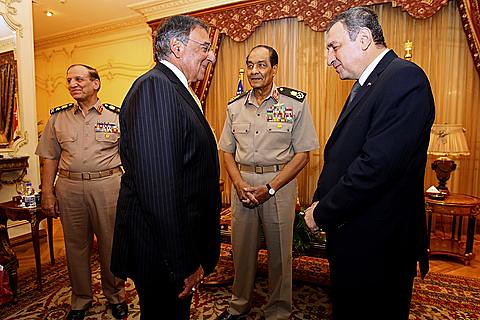
US Secretary of Defense Leon Panetta meets with Egyptian Prime Minister Essam Sharaf and Field Marshal Tantawi. The White House is concerned about developments in the North African state., a photo by Pan-African News Wire File Photos on Flickr.
Egypt's Military Steps up Battle With Activists
By HAMZA HENDAWI Associated Press
CAIRO January 18, 2012 (AP)
Egypt's military ruler has stepped up a media campaign against activists ahead of next week's anniversary of the uprising that toppled Hosni Mubarak, warning against "grave dangers" facing the nation while reassuring everyone that the military will be there protect it.
Field Marshal Hussein Tantawi's remarks published Wednesday in Egyptian media appeared aimed at rallying public opinion against protests by the pro-democracy movement planned for the Jan. 25 anniversary of the start of the uprising. Tantawi also appeared to be trying to enhance the military's image as the nation's true patriots and sending an implicit warning to the activists calling for the ruling generals to immediately step down.
"Egypt is facing grave dangers it has not seen before," said Tantawi. Calling on Egyptians to foil the "schemes and conspiracies" against the country, he said: "The armed forces is the backbone that protects Egypt. These schemes are aimed at targeting that backbone. We will not allow it and will carry out our task perfectly to hand over the nation to an elected civilian administration."
Tantawi's latest comments, like others he made previously, hark back to the Mubarak era, when officials often sought to shift attention away from domestic problems with warnings of conspiracies against the country by local agents of foreign powers. Tantawi was Mubarak's defense minister for 20 years, during which he was widely considered to be unquestioningly loyal to his patron.
His words also indicated that the military wants to exploit the frustration felt by many Egyptians over a worsening economy and tenuous security that they blame on a year of protests, clashes, strikes and sit-ins.
Activists in turn accuse the military of botching the transition to civilian rule and of killing at least 80 protesters since October. They also allege the military has tortured detainees and hauled at least 12,000 civilians before military tribunals for trial.
As liberal and leftist groups who engineered the uprising plan a new wave of demonstrations, state-run media now loyal to the military has responded with a campaign warning of a plot to destabilize the nation on the anniversary. The military itself has been ordering the arrest of key figures in the protest movement and accusing others of being agents for foreign powers.
Tantawi, who is in his late 70s, said the armed forces were "pushed into the political fray only to protect Egypt from the enemies of the nation and people." That language appears designed to counter charges by activists and politicians that the ruling generals planned all along to retain their political leverage and their privileges.
Activists claim that Tantawi and the rest of the generals sitting on the ruling Supreme Council of the Armed Forces are an extension of Mubarak's nearly 30-year rule and remain beholden to the former president, whose consent was essential to their promotion through the ranks.
The military has said it intended to hand over power to an elected president by the end of June, but many suspect the military will not easily give up the political dominance it has enjoyed ever since army officers seized power in a coup nearly 60 years ago.
Critics of the generals say they hope to promote an ex-officer or an ally as a candidate, to shield the military's budget, vast business interests and behind-the-scenes political leverage from civilian oversight.
Interior Minister Mohammed Ibrahim, brought out of retirement in November to take the Cabinet post that runs the police, has warned against what he calls attempts to destroy public property during the anniversary protests.
The state media has used the loss last month of rare books and manuscripts in a fire in a downtown library during clashes to portray activists as reckless individuals who destabilize the country. The books belonged to a research institute founded in the late 18th century.
The army's reputation, however, has taken a blow from video images of the clashes posted on social networks depicting violence against protesters. They show a woman stripped half-naked while troops kick and stomp her, and soldiers urinating on protesters from the roof of the building of parliament.
Activists have been touring cities across the nation with large screens to show the public on the streets the images. The campaign, called "liars," has irked authorities and several activists involved in it have been arrested or heckled by members of the public.
But despite those images, activists acknowledge that the army's campaign has largely worked, and that they no longer have the degree of public support which they enjoyed a year ago.
"Through media disinformation that magnifies what you like, denies what you dislike and plants in the conscience what serves your aims, you have taught people to deny what they see with their own eyes," wrote columnist Omar Taher in the Wednesday edition of the independent al-Tahrir daily. "You have pushed people to a stage of confusion where they repeat that a man's life can be replaced but not the books burnt in the institute," he wrote, addressing the generals.
No comments:
Post a Comment